Add this eBook to your basket to receive access to all 186 records. Our indexes include entries for the spelling mulholland. In the period you have requested, we have the following 186 records (displaying 41 to 50): These sample scans are from the original record. You will get scans of the full pages or articles where the surname you searched for has been found. Your web browser may prevent the sample windows from opening; in this case please change your browser settings to allow pop-up windows from this site.  British riflemen fighting in China
(1860) British riflemen fighting in China
(1860)
The China Medal was awarded to soldiers and sailors who took part in the prosecution of the war against the Chinese from 1856 to 1860. Separate clasps were awarded for men who had been in receipt of the China Medal of 1842; for being actually present at Canton on 28 and 29 December 1857, when that city was bombarded and finally captured; for being actually engaged in the operations which ceased with the first capture of the Taku Forts, 20 May 1858, and led to the Treaty of Tientsin; for being actually present at the capture of the Taku Forts 21 August 1860; and for being actually present before Pekin the day the gate of that city was given up to the allied (British and French) army, viz. on 13 October 1860. The 2nd battalion, the 60th (The King's Royal Rifle Corps) Regiment, based in Winchester, embarked for the Cape of Good Hope in June 1851, and after taking part in the Kaffir War, was moved to India, where it helped deal with the Mutiny. In 1860 the battalion was transferred to China. The regiment took part in the capture of the Taku Forts and that of Pekin. | Sample scan, click to enlarge

| Civil Service Appointments
(1860)
The Civil Service Commission published an annual list of all persons who had obtained certificates of qualification for appointment in the various public departments. The list gives full name (surname first); department (such as Post Office, or Inland Revenue); situation (such as Letter-carrier, or Clerk); and date of certificate. Candidates whose names are preceded by a dagger obtained appointments as the result of competition; a double dagger indicates open competition. Those whose names are preceded by an asterisk obtained honorary additions to their certificates either for proficiency in extra subjects chosen by themselves, or for marked proficiency in the prescribed subjects. Then follows a further list of these candidates who had obtained Honorary Additions to their Certificates in this way: giving name (surname and initials); position in the service (department and situation); subjects for which honorary additions were made; and 'extent of knowledge displayed' (such as Creditable, Fair, or Very Creditable). 1 January to 31 December 1860. | Sample scan, click to enlarge

| Patentees of New Inventions
(1861)
Abstracts of British patents for new inventions applied for and granted from 1 January to 31 December 1861: giving date, name and address, and short description of the invention. It is then stated whether 'Letters patent sealed' or 'Provisional protection only'. | Sample scan, click to enlarge
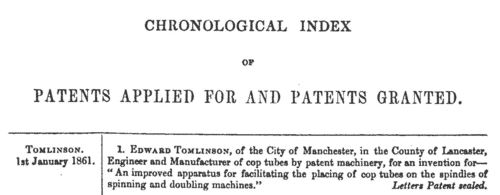
| Patentees of New Inventions
(1863)
Abstracts of British patents for new inventions applied for and granted from 1 January to 31 December 1863: giving date, name and address, and short description of the invention. It is then stated whether 'Letters patent sealed' or 'Provisional protection only'. | Sample scan, click to enlarge
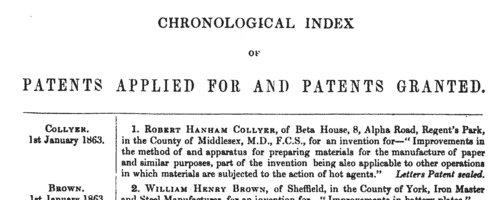
| Patentees of New Inventions
(1864)
Abstracts of British patents for new inventions applied for and granted from 1 January to 31 December 1864: giving date, name and address, and short description of the invention. It is then stated whether 'Letters patent sealed' or 'Provisional protection only'. | Sample scan, click to enlarge

| Dublin Electors
(1865)
This alphabetical list of electors for the City of Dublin for 1865 is annotated with details of the votes cast in the election of 15 July 1865 for a member of Parliament. The candidates were John Vance, Esq., D. L. (V), Benjamin Lee Guinness, Esq., D. L., LL. D. (G), and Jonathan Pim, Esq. (P). The first column gives, in bold, the initial of the ward in which lay the property that was the elector's qualification. The second column gives the elector's sequential number (alphabetically) within that ward. Then the elector's full name is given, surname first, and address, usually including house number. The votes cast are shown on the right: where these columns are blank, the elector did not vote. The key to the ward names is: A, South Dock; B, Donnybrook; C, Rathdown; D, Trinity; E, South City; F, Royal Exchange; G, Mansion House; H, Fitzwilliam; I, Wood Quay; K, Merchants' Quay; L, Usher's Quay; M, Arran Quay; N, Inns' Quay; O, North City; P, Rotundo; Q, Mountjoy; R; North Dock. S indicates the register of freemen. | Sample scan, click to enlarge
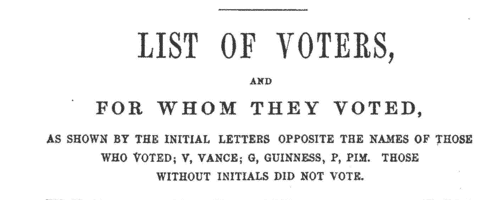
| Patentees of New Inventions
(1865)
Abstracts of British patents for new inventions applied for and granted from 1 January to 31 December 1865: giving date, name and address, and short description of the invention. It is then stated whether 'Letters patent sealed' or 'Provisional protection only'. | Sample scan, click to enlarge
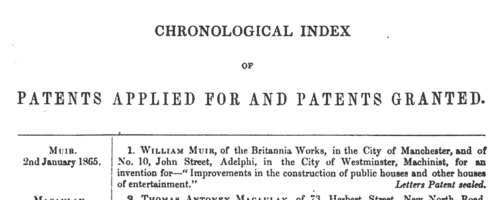
| Patentees of New Inventions
(1868)
Abstracts of British patents for new inventions applied for and granted from 1 January to 31 December 1868: giving date, name and address, and short description of the invention. It is then stated whether 'Letters patent sealed' or 'Provisional protection only'. | Sample scan, click to enlarge

|  Outstanding soldiers of the 102nd regiment of Foot
(1860-1870) Outstanding soldiers of the 102nd regiment of Foot
(1860-1870)
Each year just a handful of outstanding soldiers of the 102nd (Royal Madras Fusiliers) regiment were chosen for good conduct medals and gratuities: these are listed here. There were two lists, one for men recommended for the Good Conduct Medal without a gratuity, and one for gratuities - £5 to a private, £10 to a corporal, and £15 to a serjeant. Both lists are indexed here, and each gives rank, name, regimental number, date of recommendation and date of issue. (The sample scan is from the 105th foot) | Sample scan, click to enlarge
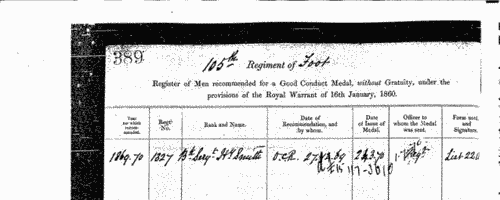
|  Men of the Commissariat Staff Corps who served in the New Zealand War
(1863-1870) Men of the Commissariat Staff Corps who served in the New Zealand War
(1863-1870)
New Zealand War Medal roll for the Commissariat Staff Corps: for service in the New Zealand campaign 1863 to 1867: the rolls were compiled following a general order in 1869 and the medals were distributed in 1870. | Sample scan, click to enlarge

|
Research your ancestry, family history, genealogy and one-name study by direct access to original records and archives indexed by surname.
|












